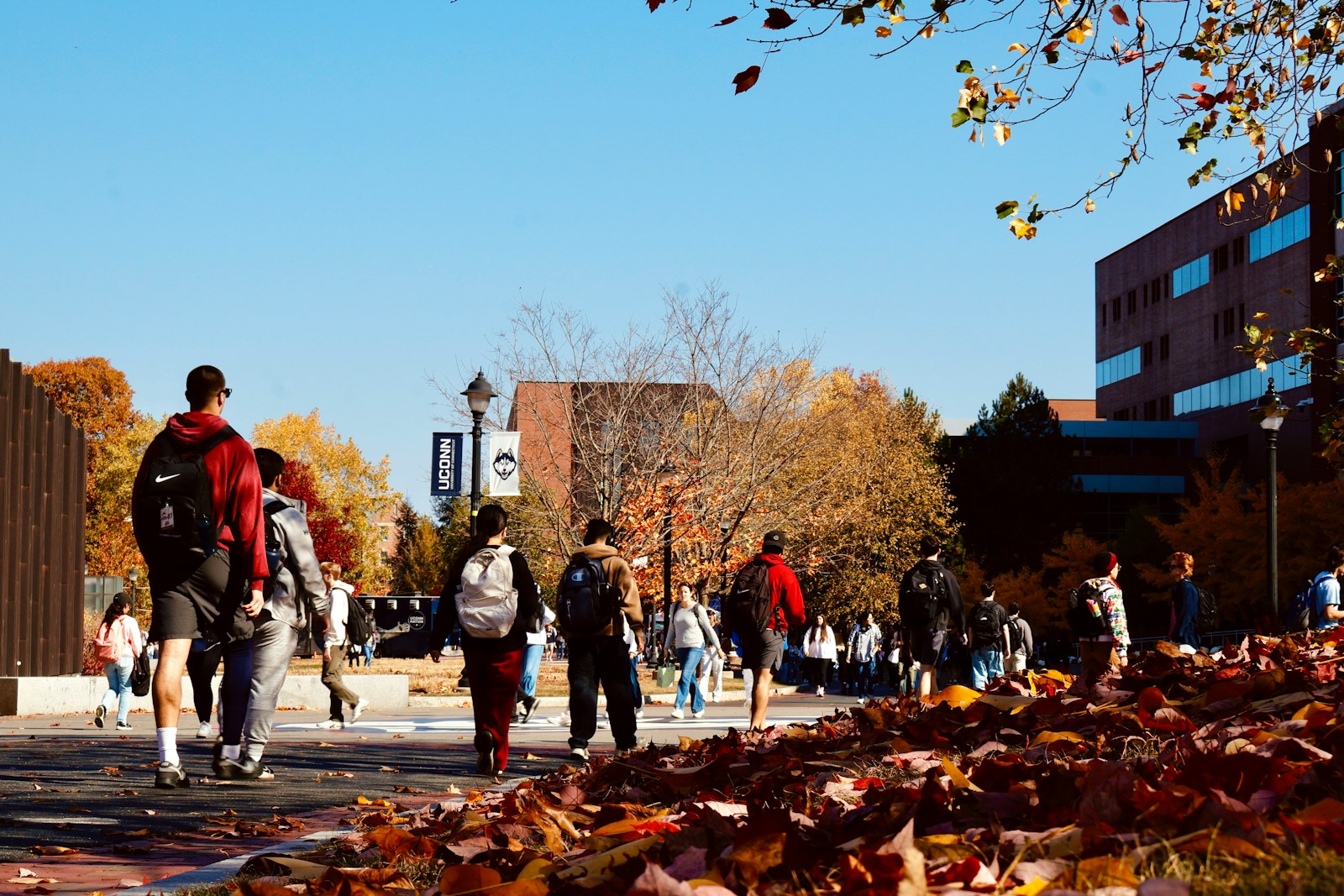By David Replogle for The Real College Guide
Do you even think about what you’re eating? Not chowing down on what’s good for you is not only bad for your bod, but your grades could suffer too.
Your whole life you’ve been spoon-fed information about the importance of good nutrition. (Your first shape? The food pyramid. And you began counting calories before blocks!)
Yet in college, eating on a whim is an everyday occurrence. And while you know poor nutrition is not good for your body, what about your brain? Here, we dish out the truth on how smart eating makes you … well, maybe not smarter, but definitely sharper.
Not-so-smart Eating Habits
Between the slop in dining halls and the abundance of greasy campus restaurants, eating healthfully on campus can be a chore. Staying away from food loaded with saturated fat and (literally) killer trans fats — can be tough when you’re addicted to the value menu. Make no mistake: You are what you eat — and the food you consume does, in fact, affect your brain. So you might want to think twice before eating …
A high-fat diet
In an Oxford University study, researchers fed rats a high-fat diet and found a significant decline in the animals’ cognitive ability, particularly short-term memory, after just nine days. Dr. Andrew Murray, the lead researcher of the Oxford study, and his team are currently conducting similar research on healthy young men.
Too much
University of Wisconsin-Madison research conducted last year by Dr. Dongsheng Cai, a professor of physiology, and his colleagues found that overeating causes the brain to react as if the food were a pathogen, resulting in an immune response that might cause brain deficits.
High-cal, high-sugar foods
The National Institutes of Health just forked over more than $5 million in funding for Drs. Kevin Niswender and Aurelio Galli, professors at the Vanderbilt University School of Medicine, to research how high-fat, high-sugar, high-calorie foods disrupt brain signals that involve mood and behavior.
Smart Food Choices
So if your diet can damage your brain, can you eat your way to a better GPA? Well, science seems to support that notion. Look for these main components of a quality diet to nourish the mind and body:
– Lean proteins: fish, skinless poultry, lentils, beans, soy products, nuts
– Fiber-rich carbohydrates: oats, brown rice, whole-grain bread
– Fruits and vegetables: leafy greens (the darker the better), broccoli, blueberries, raspberries, tomatoes
– Low-fat dairy products: skim milk, yogurt, cottage cheese
– Select oils: extra-virgin olive oil, grape seed oil
Begin by keeping good-for-you food around. “When I was attending my university, I always had some apples, oranges, walnuts, a jar of natural peanut butter and some yogurt on hand,” says Nathan Lyon, organic chef, public health expert and host of “A Lyon in the Kitchen” on Discovery Health. “These foods not only had some element of nutrition but were also satiating, thus making me less prone to walk down the street to suck down a box of chocolate-chip cookies with a doughnut chaser.”
Certain foods are classified by nutritionists as “brain foods,” and fatty fish seems to lead the pack. The American Dietetic Association and American Heart Association both recommend eating fatty fish such as salmon, tuna, tilapia and trout two to three times a week to promote heart health and skin health, and benefit short-term memory.
Additionally, the ADA recommends blueberries, which are rich in phytochemicals — nutrients that help reverse deficits in memory. The AHA stresses the importance of tofu, soybeans, walnuts and flaxseed, all of which help lower cholesterol, which means a healthier heart … and brain. So it’d be smart to pop these power foods onto your plate.
Snacks to Help You Sleep Yourself Smart
Yes, we know you love your doughnuts. But foods high in simple carbs (what some people refer to as the “evil whites”: white bread, white rice, non-whole-grain pasta) are also high on what’s known as the glycemic index. White carbs, especially when loaded with sugar, cause major ups and downs in blood sugar that can interfere with a good night’s sleep and disrupt concentration.
“Let’s say the night before an exam you consume a big bowl of pasta for dinner,” says Lyon. “What happens is you will eventually get hypoglycemic due to your blood sugar response via the simple carbs, which then results in a terrible night’s sleep.”
Instead of pasta before bed, reach for some fat. “By eating some kind of fat at bedtime — a piece of cheese, an apple with almond butter, a handful of nuts or whole-milk yogurt (with minimal sugar) –, you tend to sleep through the night, no problem. Sleep is paramount to good health. If you want to lose weight? Sleep more. Do better in class? Sleep more. Feel more energized and look great? Sleep more.”
Lyon also stresses the importance of knowing which fats are good for you (the fats that come from fatty fish and nuts are the healthy kind: polyunsaturated), as well as the difference between complex and simple carbohydrates.
“The thing about carbs and fat is that people make them out to be bad,” says Lyon.“But if you are eating whole grains, like a barley risotta paired with roasted winter squash, braised kale, a shaving of Parmesano Romano and a good drizzle of olive oil to finish? Then that’s different. Barley is a complex carb. So is oatmeal, brown rice and root vegetables. Olive oil is a good fat. But if you are sucking down pizza six nights a week, well then, those simple carbs are not so good.”
Skipping Breakfast Is Stupid
OK, let’s say you’re sleeping more. So you wake up late and have to get to class — no time for breakfast. Turns out, this first meal of the day is crucial. Researchers have long found that eating breakfast is linked to higher test scores and better overall school performance.
Four years ago, Gregory W. Phillips, who holds a doctorate in biology and teaches at Blinn College, in Schulenburg, Texas, published a study titled “Does Eating Breakfast Affect the Performance of College Students on Biology Exams?” in Bioscene: Journal of College Biology Teaching. Indeed, Phillips found that nearly three-quarters of participants who passed had eaten breakfast. Of the students who did not eat in the a.m.? Only half passed the exam. When breaking it down into letter grades, the most A’s and B’s belonged to students who ate breakfast, and non-breakfast eaters scored the most C’s and D’s.
The study “provides a platform from which to strongly encourage college students to eat breakfast as a method of augmenting their study strategies,” says Phillips. “While eating breakfast can’t ensure students will pass the exam, this research does suggest that eating breakfast provides students with an advantage.”
But what you eat matters too.
A good mix of those aforementioned complex carbohydrates and proteins is the ultimate breakfast to balance the chemicals in your brain and allow for enhanced learning. Breakfasts high only in carbs or protein, as well as those chock-full of sugar (cut the Frosted Flakes and French toast), throw off this balance and usually result in sluggishness and inattentiveness. Some good suggestions for breakfast time are complex carbs like oatmeal and whole-grain toast; proteins like scrambled eggs, peanut butter and almonds; and fruits like blueberries and sliced apples.
During his years as a health sciences major at James Madison University, in Harrisonburg, Va., Lyon would have the same meal every morning before an exam: “A bowl of oatmeal with sliced banana, frozen blueberries, toasted pecans and a light drizzle of real maple syrup. It was always just the right amount.”


